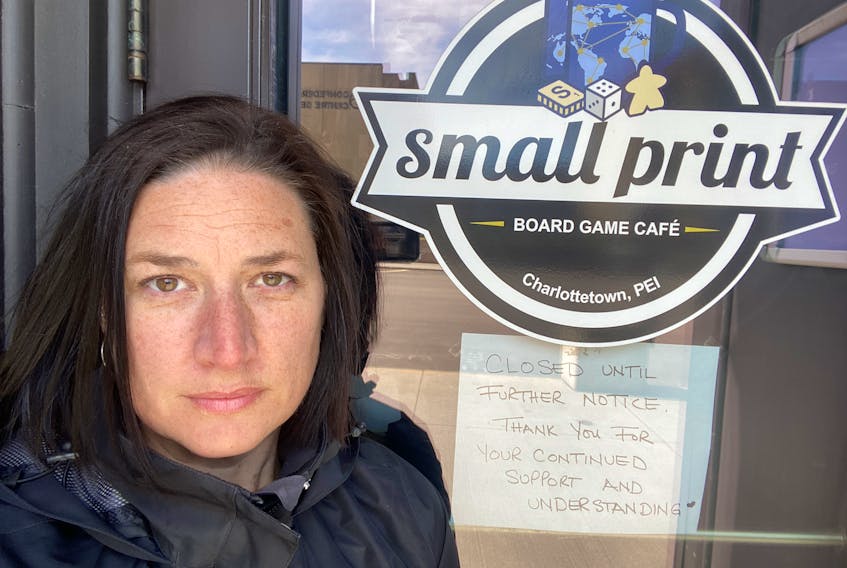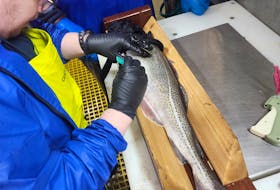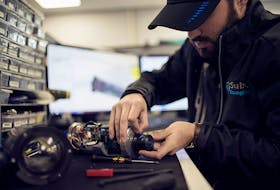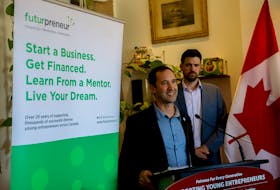For a while, the virus known as 2019-nCoV and its attendant disease, COVID-19, felt comfortably distant. Even in the first days of March, it seemed like North America would dodge the bullet one more time and the pandemic would remain a story that happened “over there.”
Then we started hearing about states of emergency – in Prince Edward Island on March 16, Newfoundland and Labrador followed suit on March 18, and by March 22, Nova Scotia was locked down as well. 2019-nCoV was here.
The impact so far has been total. For local business owners, the ones still operating, it’s been a strange time. Many businesses are struggling to walk a line between being glad to be open and sad others have been forced to close; glad to be serving customers, upset they had to lay off employees. They’re in the same holding pattern we’ve all been in.

Amy Seymour owns Small Print Board Game Café in Charlottetown, P.E.I., which she took over from its original owners this past September. She remembers the strangeness of their last day of normal operation.
“My husband and I went into work on Saturday, planning at least to finish out the day. But the vibe, the mood in the air, was so intense that day we decided to shut down at seven o’clock and that was it, because things just changed so fast,” she says. “It was like right out of a movie, just how fast everything turned.”
Initially, Seymour struggled with the uncertainty. She was tuning into the news to hear the prime minister and to listen to P.E.I.’s chief public health officer, Dr. Heather Morrison.
“You didn’t know what was coming from one day to the next. Are you going to be closed for two weeks? Are you going to be closed for six months? Are you going to be closed for a year-and-a-half? We had no idea, and so it was just a gut-wrenching sort of feeling.”
Adapting to change
Small Print has survived by selling board games online, combining those offerings with craft kits from Seymour’s other business, the Mobile Makery. But board game cafés are built around playing games, not just selling them. So, Small Print launched an online trivia night that has achieved a reach that surprised Seymour.
“The trivia has been way more successful than I anticipated. Week after week, we’re getting to know people,” she says. “We have people playing from Australia, we have people from Scotland, from Japan, from all over Canada, tuning in to play. Granted, the prizes are reserved for PEI teams and players, but we have people from all over, which makes for some pretty cool conversation.”
The natural world does not feel the need to obey narratives - that’s why Seymour is dealing with a pandemic six months after taking over a business. For Krista Elliott at St. John’s Soap Works, this is the second major blow in just a few months, following the absurd snowfall in January.
“We got hit hard with that. Financially, all the businesses here were going through a hard time. And we did get a big surge of support from the community, which was great,” says Elliot.
“And that has continued through this. We’re always amazed at how wonderful the people are in the community. Because it’s been what, a month now? And they’re just as supportive now as they were.”

The Soap Works was just beginning to expand into US markets when everything shut down. Most of Elliott’s business was wholesale or farmers’ markets, and without those revenue streams, she wasn’t sure if the business would survive or whether she would be able to pay her employees. In the end, she decided they were better off on EI or with CERB benefits than an uncertain paycheck.
“The decision to have to lay off staff was probably the hardest. It was not something we wanted to do,” says Elliott. “The employees were with us from the very beginning since we opened. And it was a difficult decision to make. I didn’t want to put them in a situation where I couldn’t pay them.”
With her main revenue streams dormant, Elliott has pivoted to online retail, delivery and curbside pickup.
“We had been doing some online sales, but it really wasn’t the biggest focus of our business. We had to restructure and now we do online. Some people call in, but the majority is online now,” she says.
“We never did curbside pickup before. And we didn’t do home delivery. And there’s a learning curve there too.”
Elliott is grateful that her business can remain open in any capacity at a time when many have been forced to close altogether. But the Soap Works will likely not emerge from this unchanged.
“[Online ordering] is something we hadn’t really taken full advantage of before, so that’s definitely going to be more of a focus when we do get back to normal, whatever normal might be,” says Elliott. “Our overhead is still the same as it was, and our income is less. I won’t be gone, but I might end up moving to a smaller place.”
Back to basics
For Souper Duper Soup in downtown Dartmouth, N.S., COVID-19 restrictions have forced a kind of return to their roots.
“We’re used to growing and expanding and rolling with what we’re doing,” says co-owner Roz Wilson-Oliver.
“We started out just delivering, so going back to it has been kind of an interesting thing. Earlier, we were worried that we were going to be mandated to close, but we’re happy that we didn’t and that we’re just able to keep going.”
Wilson-Oliver had been following the progress of the virus overseas for some time, since her daughter was supposed to take a trip to Europe with her school. As the situation became more serious, Souper Duper Soup decide to act.
“We went to takeout a week before we were mandated to go to takeout-only,” she says “We just decided that it would probably be the right idea to not have that many people in our space. And they were talking about closing restaurants and things like that anyway.”
In the current setup, customers can come into the store one at a time to pick up orders. Most people are calling order in or placing orders online. Despite the lack of a dining room, Souper Duper Soup hasn’t seen much drop-off in overall sales.
“Originally, we thought things were a little bit slower, but we’ve researched and looked at our past sales and we seem to be really right on par. We have really great, loyal customers, so it’s not surprising that they want to keep supporting us. But it’s really nice.”
Like their counterparts in P.E.I. and Newfoundland, they’ve found a bit of a silver lining in being forced to adapt.
“We’re definitely going to keep the online store going and we’ll probably continue some form of delivery after this,” she says. “Learning the online order system and adding all of our things to that, it’s been a new experience for us.”
In all three provinces, businesses that still operate are in a strange limbo. They are grateful to still be operating, and therefore unwilling to complain about the impact. And yet they are impacted. Eager to return to normal, but also wondering what they’ll look like when they do return.









